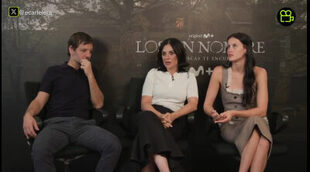(This article may contain spoilers of the movies mentioned)
Because of the lack of a specific answer, these complicated relationships alway spike our interest and curiosity. Why? It's much more exciting when we have to use our imagination to complete the story.
-

-

-

-

-

-

Many times it's just a simple gesture. A look or a phrase that allows you to detect a love story in disguise. Situations that we experience in 'Farewell, My Queen', 'And Your Mother Too', 'Fried Green Tomatoes' and even 'Julieta' by Pedro Almodovar. In all of them them the homoerotic themes have been muted - either to a greater or lesser extent.
Big Questions
Other times the existence of a subtext is less evident but we still sense that something doesn't quite fit. Behaviors that are just a little off the norm. Equally disconcerting is the storm of hate and contempt that arises between the two friends of 'Queen of Earth' or the intense looks between the two protagonists of the mythical 'Ben-Hur'. These questions don't have any solid answers, as the relationships were complicated, but it raises the question.

1 Thelma & Louise
The final kiss that is shared between Susan Sarandon and Geena Davis in the feminist road movie, directed by Ridley Scott removes any doubt about the sexual orientation of their protagonists. While for some moviegoers is a simple gesture of solidarity and affection between friends (something quite acceptable taking into account that both are on the verge of committing suicide in the Grand Canyon), for other spectators, the discrete peck reflects a repressed passion. In this sense, Sarandon wanted to discard the second option arguing that their characters "were beyond simple sexuality, what they felt was love".

2 Farewell, My Queen
Unlike the rock and baroque version offered by Sofia Coppola of the mythical character of Marie Antoinette, Benoît Jacquot opted for approaching the popular figure from an optical quite different. In 'Farewell, My Queen' we witness a parade of destruction, decadence and despair. But we also see a kind of love triangle composed of three large women: Gabrielle de Polignac (Virginie Ledoyen), Marie Antoinette (Diane Kruger) and your reader Sidonie (Seydoux). Unanswered questions, glances furtive and indecent requests were thrown in the air to dominate a frame that incorporates different points of view of a historic event analyzed to no end. A work that emphasizes, in cryptic fashion, one of the more diffused rumours of the time: the alleged homosexual orientation of the unfortunate queen.

3 Magical Girl
Carlos Vermut is an expert in leaving hollow narrative in his stories so the viewer complete them. An interesting strategy that he used in 'Magical Girl'. In this case, the filmmaker omitted and blurs the turbulent but sentimental relationship that unites Barbara (Barbara Lennie) and her old Professor Damian (José Sacristán). We can see, thanks to another reference, that the second feels an unconditional love for the young woman, which allows him to wake the instinct killer that hides inside.

4 And Your Mother Too
Alfonso Cuarón's film seems to deal with a particularly subtle, covert love affair. During the feature film, July (Gael Garcia Bernal) and Tenoch (Diego Luna) maintain a relationship of friendship characterized by complicity and loyalty. However, the viewer begins to reinterpret those feelings, thanks to a series of uncomfortable silences and unjustified behavior. No one says anything, but everyone knows. This film denounces the insufferable, Mexican homophobia whilst the filmmaker chooses to silence the homoerotic element within the scenes.

5 Julieta
Calling attention to 'Julieta' and the incredible silence respect between Antía and Bea. As the plot progresses, we get the impression that the daughter of the actor remained in a relationship with the young woman which ends badly. And although the film of Pedro Almodovarno includes not a single confession, a mature Bea (Michelle Jenner) leaves this issue to us by the end of the film. A script decision that is justified since it supports an idea that runs throughout the film: Antía is a real unknown to her mother, Juliet (and therefore the viewers).

6 The Dreamers
The film of Bernardo Bertolucci presents somewhat particular games between Matthew (Michael Pitt), Isabelle (Eva Green) and her brother Theo (Louis Garrel). The last two have a disconcerting relationship and invite Matthew to join the group through "tests of love" (such as having sex and shaving pubic hair). The eroticism, the liberal relations and the meaningless sex parade by this film that escapes of the normal social conventions and preset moral standards. A trio with few brakes to give free rein to your imagination. It should be noted that the contact between Theo and Matthew is somewhat blurred since it's said that Bernardo Bertolucci eliminated parts of the homoerotic relationship.

7 Stoker
The love-hate relationship between India (Mia Wasikowska) and her uncle Charlie (Matthew Goode) is capable of generating concern in the more veteran film buff. The director of 'The Handmaiden' plays constantly with our expectations within this unhealthy story dominated by dark and ambiguous characters. It is by this that we include to 'Stoker' and it's repressed duo protagonists within our list.

8 Fried Green Tomatoes
The number of spectators whom felt disappointed at an adaptation of the novel by Fannie Flag were not few in number. And the version created for big screen opted to replace the clearly lesbian relationship between the two protagonists with a rather soft, platonic friendship. A decision that, of course, prevented from developing a romantic plot between Idgie (Mary Stuart Masterson) and Ruth (Mary-Louise Parker). "The passion that these women feel between each other wasn't portrayed openly in the film. It was as if someone had filled me with fleas. During your viewing I felt irritated because you didn't tell the truth" was said to the writer and producer Susie Bright.

9 Queen of Earth
Elisabeth Moss ('Mad Men') and Katherine Waterston ('Fantastic Beast and Where to Find Them') give life in the 'Queen of Earth' to a couple of friends whom take a holiday with the objective of relaxing and forgetting their past worries. However, as the days pass, the viewer is witness to blame wars, odd behaviors and humiliating situations. The cause of the unexpected rivalry calls attention to the unraveling emotions that drives the protagonists. Also by a lack of knowledge about the origin of such hate and repulsion. Highly recommended for those who enjoy the jibes, multiple watchings and the dramatic tension present in films like 'Persona' by Ingmar Bergman.

10 The Silence
Ingmar Bergman's work show us the complex link between two sisters called Ester (Ingrid Thulin) and Anna (Gunnel Lindblom). We soon discover that affection, scorn, arguments and submission are core elements within their relationship. Their behavior is reminiscent of married couples in the middle of a messy divorce. Therefore, the narration is stained by a rarefied, tense and extremely dark atmosphere. Is clear that the Bergman tends to favor second viewings and 'The Silence' is not an exception.

11 Rope
Alfred Hitchcock moves on to color in 1948 with a history full of tension and homoeroticism. 'Rope', which centres on two 'lover' assassins called Phillip (Farley Granger) and Brandon (John Dall), who generated a large controversy in its time due to the rigid censorship. In fact, even still, some of the details that hide some gay readings are analyzed (intense fingering bottles included). "We knew that they were gay, there was no doubt." But nobody mentioned it. This was 1947. "Don't forget that" says Granger, in the documentary 'The Celluloid Closet'.

12 The Piano Teacher
The protagonist of this story, Erika (Isabelle Huppert), manifests a mental disorder marked by sadomasochism, perversion and psychosis. Because there are few bloody scenes in which we contemplate the piano teacher that show she is self-mutilating and developing destructive behaviors with one of her students. However, she also calls the attention the unhealthy emotional link that Erika maintains with her totalitarian and abusive mother (Annie Girardot).

13 Ben-Hur
There are more than a few analyses of this film that have observed certain subtext gay in the 1959 version of 'Ben-Hur'. And it seems that the relationship between the protagonist (Charlton Heston) and his old companion Messala (Stephen Boyd) always was marked by certain sexual tension. The writer Gore Vidal, whom the director of the film requested advise from, was one of the figures who proposed the gay subplot within the film. William Wyler asked "What are you going to do?" and I replied "Let me try something; say that these boys were 15 or 16 years old the last time they saw, were lovers and now reunite and the Roman (Messala) wants to start again," says Vidal in the documentary 'Celluloid Closet'. All this subtext, by the way, has disappeared in the recent version directed by Timur Bekmambetov.

14 Rebecca
Although homosexuality is never explicitly mentioned in 'Rebecca', it's obvious that the housekeeper (Judith Anderson) is at least slightly attracted to other women. Mrs. Danvers represents a type of lesbian whom is neurotic and obsessed with her object of desire that not is another that the late, first, Mrs. de Winter. "There is a scene that draws the attention of the gay community. Rebecca is dead and the Mrs. Danvers opens the drawer of your clothes inside. "It's very sensual" says Susie Bright.